This site uses cookies as defined in our Cookie Policy, by continuing to use this site you agree to their use.
Continue
| Arrive | Depart | ||||||
| 16th16 | MayMay | 202525 | Anchorage, Alaska, United States, embark on the MS Roald Amundsen | ||||
Anchorage is the largest city in Alaska. Located between mountains, it is a beautiful mixture of urban and wilderness. Thanks to its proximity to the Chugach State Park with its 45 species of mammals and the city's rich history, there is so much to be seen in this unique destination. | |||||||
| 17th17 | MayMay | 202525 | Seward, Alaska, United States | 20:00 | |||
It is hard to believe that a place as beautiful as Seward exists. Surrounded on all sides by Kenai Fjords National Park, Chugach National Forest, and Resurrection Bay, Seward offers all the quaint realities of a small railroad town with the bonus of jaw-dropping scenery. This little town of about 2,750 citizens was founded in 1903, when survey crews arrived at the ice-free port and began planning a railroad to the Interior. Since its inception, Seward has relied heavily on tourism and commercial fishing. It is also the launching point for excursions into Kenai Fjords National Park, where it is quite common to see marine life and calving glaciers. | |||||||
| 18th18 | MayMay | 202525 | College Fjord, Alaska, United States | 08:00 | 13:00 | ||
College Fjord in the northern sector of Prince William Sound, is considered one of the most scenic fjords in the world with spectacular glacier viewing. . There are over a dozen major glaciers in the fjord, all surrounded by rugged snow-capped mountains. It is possible from one point to see eight glaciers at once. College Fjord was discovered in 1899 during the Harriman Expedition. Edward Henry Herriman, a millionaire railroad tycoon, set sail with 125 other passengers and crew, including 23 of esteemed scientists from several Ivy League schools, to explore the fjords of Alaskan. The scientists named the glaciers in this fjord after their Ivy League alma maters and their sister schools. Those names include Amherst, Barnard, Bryn Mawr, Harvard, Smith, Vassar, and Yale. The glaciers of the northwest side feature names of women's colleges and those of the southeast side are names of men's colleges. | |||||||
| 19th19 | MayMay | 202525 | At Sea | 10:00 | 15:00 | ||
| 20th20 | MayMay | 202525 | William Henry Bay, Alaska, United States | 14:30 | 22:00 | ||
| 21st21 | MayMay | 202525 | Haines, Alaska, United States | 08:00 | 18:00 | ||
Unlike most cities of Southeast Alaska, Haines can be reached by road. With a population of 2,200, Haines lies in the upper northern reaches of the Inside Passage and is an important access point to the Yukon Territory and Interior Alaska. While cruising into Haines, see the Lynn Canal, the longest and deepest fjord in North America. Once in town, mountains seem to surround you on all sides while the jagged cathedral peaks of the Chilkat Mountains loom over Fort Seward. Haines has two distinct personalities. On the north side of the Haines Highway is the section of Haines that developed around the Presbyterian mission. After its missionary beginnings, it served as the trailhead for the Jack Dalton Trail into the Yukon during the 1897 gold rush to the Klondike. South of the highway, the town resembles a military post, which is exactly what it was for nearly half a century. In 1903 the U.S. Army established Fort William Henry Seward at Portage Cove just south of town. The post (renamed Chilkoot Barracks in 1922) was the only military base in the territory until World War II. In 1939, the army built the Alaska Highway and the Haines Highway to connect Alaska with the other states. Today, the community of Haines is recognized for the Native American dance and culture center at Fort Seward as well as for its superb fishing, camping and outdoor recreation. | |||||||
| 22nd22 | MayMay | 202525 | Tracy Arm, Alaska, United States | 08:00 | 15:00 | ||
As part of the Tracy Arm-Fords Terror Wilderness, Tracy Arm is within the Tongass National Forest. Tracy Arm is one of Alaska’s classic fjords. At the end of the narrow and almost 50 km long fjord, passing breathtaking mountains, steep cliffs and spectacular waterfalls, one can see the twin Sawyer Glaciers, South Sawyer and North Sawyer, active tidewater glaciers. Wildlife of the area includes whales, harbor seals, eagles, kittiwakes, Arctic Terns and Pigeon Guillemots. | |||||||
| 23rd23 | MayMay | 202525 | Sitka, Alaska, United States | 09:00 | 18:00 | ||
It's hard not to like Sitka, with its eclectic blend of Alaska Native, Russian, and American history and its dramatic and beautiful open-ocean setting. This is one of the best Inside Passage towns to explore on foot, with St. Michael's Cathedral, Sheldon Jackson Museum, Castle Hill, Sitka National Historical Park, and the Alaska Raptor Center topping the must-see list.Sitka was home to the Kiksádi clan of the Tlingit people for centuries prior to the 18th-century arrival of the Russians under the direction of territorial governor Alexander Baranof, who believed the region was ideal for the fur trade. The governor also coveted the Sitka site for its beauty, mild climate, and economic potential; in the island's massive timber forests he saw raw materials for shipbuilding. Its location offered trading routes as far west as Asia and as far south as California and Hawaii. In 1799 Baranof built St. Michael Archangel—a wooden fort and trading post 6 miles north of the present town.Strong disagreements arose shortly after the settlement. The Tlingits attacked the settlers and burned their buildings in 1802. Baranof, however, was away in Kodiak at the time. He returned in 1804 with a formidable force—including shipboard cannons—and attacked the Tlingits at their fort near Indian River, site of the present-day 105-acre Sitka National Historical Park, forcing many of them north to Chichagof Island.By 1821 the Tlingits had reached an accord with the Russians, who were happy to benefit from the tribe's hunting skills. Under Baranof and succeeding managers, the Russian-American Company and the town prospered, becoming known as the Paris of the Pacific. The community built a major shipbuilding and repair facility, sawmills, and forges, and even initiated an ice industry, shipping blocks of ice from nearby Swan Lake to the booming San Francisco market. The settlement that was the site of the 1802 conflict is now called Old Sitka. It is a state park and listed as a National Historic Landmark.The town declined after its 1867 transfer from Russia to the United States, but it became prosperous again during World War II, when it served as a base for the U.S. effort to drive the Japanese from the Aleutian Islands. Today its most important industries are fishing, government, and tourism. | |||||||
| 24th24 | MayMay | 202525 | Chatham Strait, Alaska, United States | 09:00 | 18:00 | ||
| 25th25 | MayMay | 202525 | Wrangell, Alaska, United States | 08:00 | 18:00 | ||
A small, unassuming timber and fishing community, Wrangel sits on the northern tip of Wrangel Island, near the mouth of the fast-flowing Stikine River—North America's largest undammed river. The Stikine plays a large role in the life of many Wrangel residents, including those who grew up homesteading on the islands that pepper the area. Trips on the river with local guides are highly recommended as they provide, basically, an insider's guide to the Stikine and a very Alaskan way of life. Like much of Southeast, Wrangel has suffered in recent years from a declining resource-based economy. But locals are working to build tourism in the town. Bearfest, which started in 2010, celebrates Wrangel's proximity to Anan Creek, where you can get a close-up view of both brown and black bears. Wrangel has flown three different national flags in its time. Russia established Redoubt St. Dionysius here in 1834. Five years later Great Britain's Hudson's Bay Company leased the southern Alaska coastline, renaming the settlement Ft. Stikine. It was rechristened Wrangel when the Americans took over in 1867; the name came from Baron Ferdinand Petrovich von Wrangel, governor of the Russian-American Company. The rough-around-the-edges town is off the track of the larger cruise ships, so it does not get the same seasonal traffic that Ketchikan and Juneau do. Hence, it is nearly devoid of the souvenir shops that dominate so many other nearby downtown areas. But the gift shops and art galleries that are here do sell locally created work, and the town is very welcoming to visitors; independent travelers would do well to add a stop in Wrangel during their Southeast wanderings. | |||||||
| 26th26 | MayMay | 202525 | Misty Fjords National Monument, Alaska, United States | 08:00 | 14:00 | ||
Rudyerd Bay is one of the highlights of the Misty Fiords, 40 miles east of Ketchikan, along the Inside Passage. This fjord cuts through steep-sided mountainous terrain and extends far into the mainland. The scenery is stunning, with dramatic thousand-foot waterfalls plunging down rainforest covered cliffs to the water below. | |||||||
| 26th26 | MayMay | 202525 | Prince Rupert, British Columbia, Canada | 22:30 | 23:30 | ||
Just 40 mi (66 km) south of the Alaskan border, Prince Rupert is the largest community on British Columbia's north coast. Set on Kaien Island at the mouth of the Skeena River and surrounded by deep green fjords and coastal rain forest, Prince Rupert is rich in the culture of the Tsimshian, people who have been in the area for thousands of years. As the western terminus of Canada's second transcontinental railroad and blessed with a deep natural harbor, Prince Rupert was, at the time of its incorporation in 1910, poised to rival Vancouver as a center for trans-Pacific trade. This didn't happen, partly because the main visionary behind the scheme, Grand Trunk Pacific Railroad president Charles Hays, went down with the Titanic on his way back from a financing trip to England. Prince Rupert turned instead to fishing and forestry. A port of call for both BC and Alaska ferries, but relatively new to cruise ships, this community of 15,000 retains a laid-back, small-town air. | |||||||
| 27th27 | MayMay | 202525 | At Sea | ||||
| 28th28 | MayMay | 202525 | Alert Bay, British Columbia, Canada | 07:00 | 15:00 | ||
Alert Bay is a small village on Cormorant Island, with approximately 1,300 residents. More than half are First Nations people. The settlement was named in 1860 in honour of the Royal Navy ship HMS Alert, which conducted survey operations in the area. The traditional Kwakwaka’wakw people of Alert Bay have endured a difficult history of devastating foreign diseases and failed government policies of assimilation. Today there is a revival of their traditions. One of the most well-known features in Alert Bay is the 173 foot wooden carved totem pole, claimed by some to be the tallest totem pole in the world. | |||||||
| 29th29 | MayMay | 202525 | Vancouver, British Columbia, Canada | 08:00 | |||
Vancouver is a delicious juxtaposition of urban sophistication and on-your-doorstep wilderness adventure. The mountains and seascape make the city an outdoor playground for hiking, skiing, kayaking, cycling, and sailing—and so much more—while the cuisine and arts scenes are equally diverse, reflecting the makeup of Vancouver's ethnic (predominantly Asian) mosaic. Vancouver is consistently ranked as one of the world's most livable cities, and it's easy for visitors to see why. It's beautiful, it's outdoorsy, and there's a laidback West Coast vibe. On the one hand, there's easy access to a variety of outdoor activities, a fabulous variety of beaches, and amazing parks. At the same time, the city has a multicultural vitality and cosmopolitan flair. The attraction is as much in the range of food choices—the fresh seafood and local produce are some of North America's best—as it is in the museums, shopping, and nightlife.Vancouver's landscaping also adds to the city's walking appeal. In spring, flowerbeds spill over with tulips and daffodils while sea breezes scatter scented cherry blossoms throughout Downtown; in summer office workers take to the beaches, parks, and urban courtyards for picnic lunches and laptop meetings. More than 8 million visitors each year come to Vancouver, Canada's third-largest metropolitan area. Because of its peninsula location, traffic flow is a contentious issue. Thankfully, Vancouver is wonderfully walkable, especially in the downtown core. The North Shore is a scoot across the harbor, and the rapid-transit system to Richmond and the airport means that staying in the more affordable ’burbs doesn't have to be synonymous with sacrificing convenience. The mild climate, exquisite natural scenery, and relaxed outdoor lifestyle keep attracting residents, and the number of visitors is increasing for the same reasons. People often get their first glimpse of Vancouver when catching an Alaskan cruise, and many return at some point to spend more time here. | |||||||
| 30th30 | MayMay | 202525 | Vancouver, British Columbia, Canada, disembark the MS Roald Amundsen | ||||
Vancouver is a delicious juxtaposition of urban sophistication and on-your-doorstep wilderness adventure. The mountains and seascape make the city an outdoor playground for hiking, skiing, kayaking, cycling, and sailing—and so much more—while the cuisine and arts scenes are equally diverse, reflecting the makeup of Vancouver's ethnic (predominantly Asian) mosaic. Vancouver is consistently ranked as one of the world's most livable cities, and it's easy for visitors to see why. It's beautiful, it's outdoorsy, and there's a laidback West Coast vibe. On the one hand, there's easy access to a variety of outdoor activities, a fabulous variety of beaches, and amazing parks. At the same time, the city has a multicultural vitality and cosmopolitan flair. The attraction is as much in the range of food choices—the fresh seafood and local produce are some of North America's best—as it is in the museums, shopping, and nightlife.Vancouver's landscaping also adds to the city's walking appeal. In spring, flowerbeds spill over with tulips and daffodils while sea breezes scatter scented cherry blossoms throughout Downtown; in summer office workers take to the beaches, parks, and urban courtyards for picnic lunches and laptop meetings. More than 8 million visitors each year come to Vancouver, Canada's third-largest metropolitan area. Because of its peninsula location, traffic flow is a contentious issue. Thankfully, Vancouver is wonderfully walkable, especially in the downtown core. The North Shore is a scoot across the harbor, and the rapid-transit system to Richmond and the airport means that staying in the more affordable ’burbs doesn't have to be synonymous with sacrificing convenience. The mild climate, exquisite natural scenery, and relaxed outdoor lifestyle keep attracting residents, and the number of visitors is increasing for the same reasons. People often get their first glimpse of Vancouver when catching an Alaskan cruise, and many return at some point to spend more time here. | |||||||
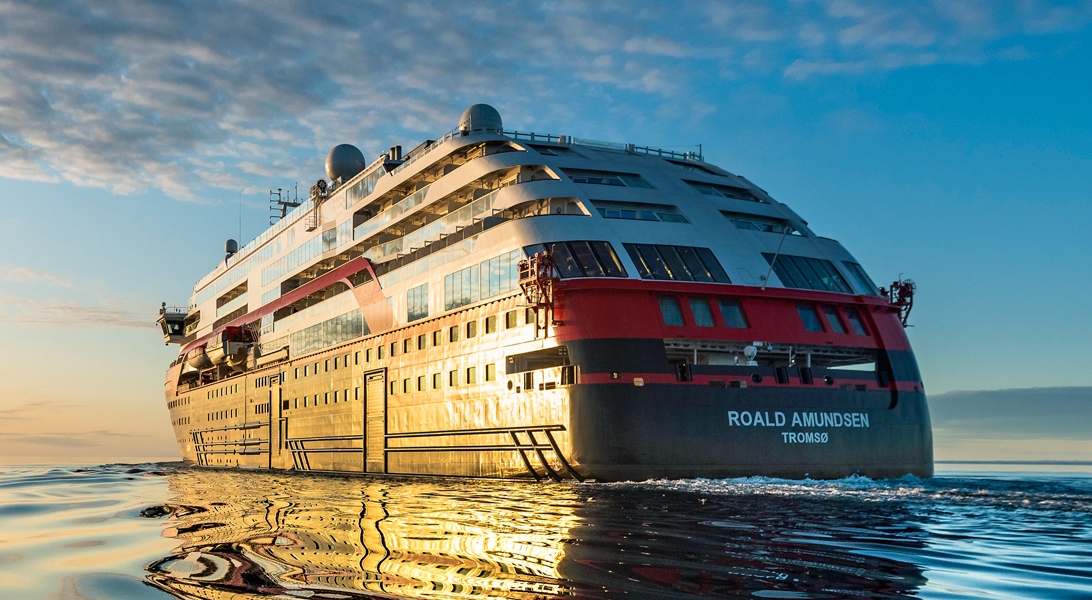









The images shown are for illustration purposes only and may not be an exact representation of what you find on the ship.
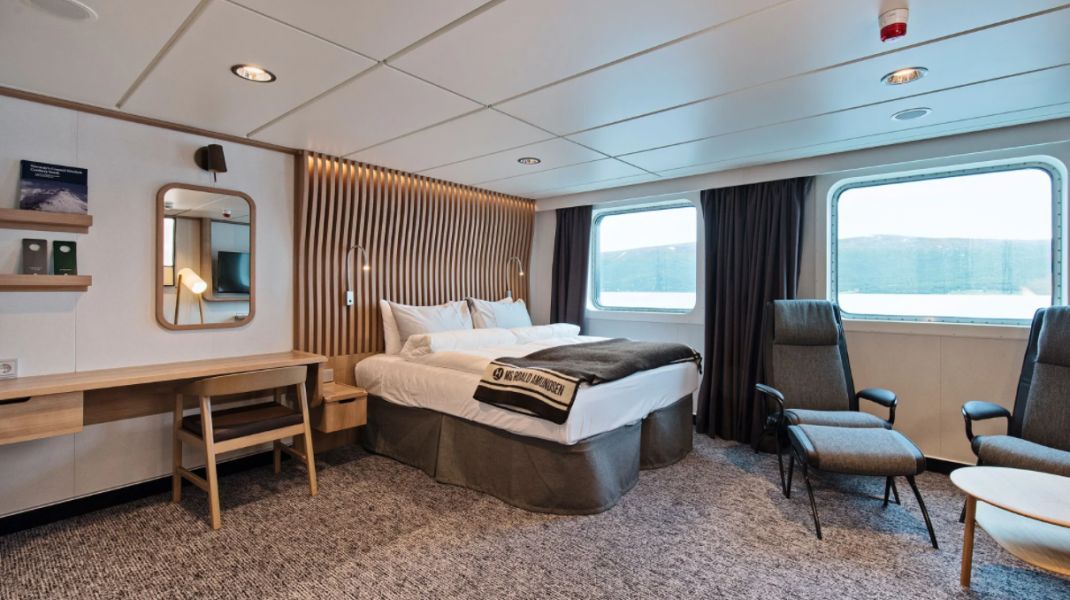
Large accessible cabins without balcony. Lower/middle decks, flexible sleeping arrangements, TV, kettle, tea and coffee.

Large cabins without balcony. Lower/middle decks, flexible sleeping arrangements, sofabed, TV, kettle, tea and coffee.
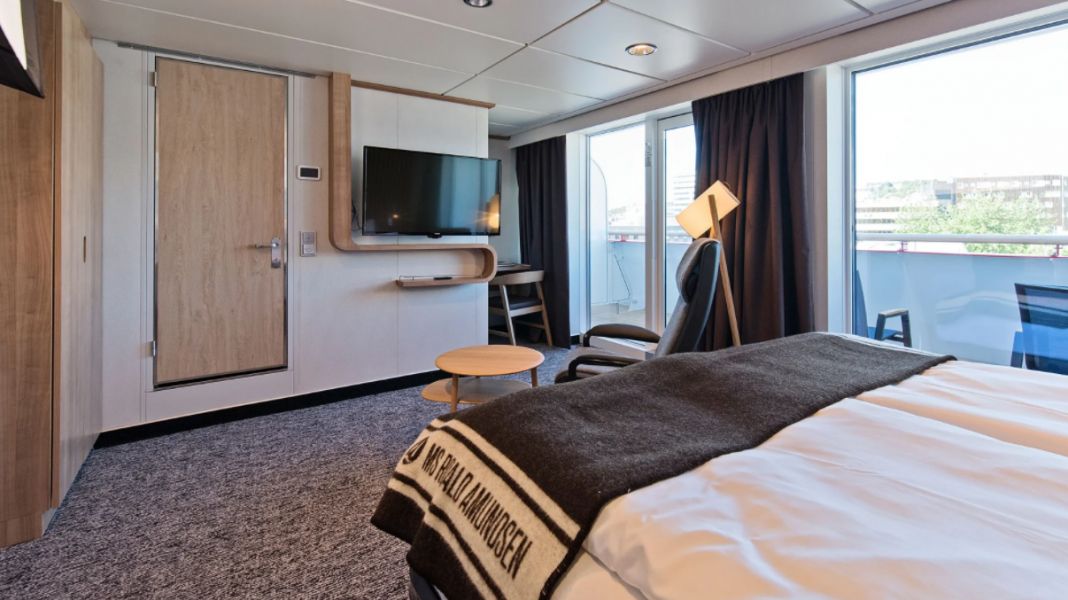

Accessible cabin with balcony. High deck, broad balcony, double bed, TV, kettle, tea and coffee.

Cabins on a high deck with balcony. Spacious cabins, different sizes, double bed, some with sofabed, TV, kettle, tea and coffee.

High deck cabins with balcony. Spacious cabins, different sizes, flexible sleeping arrangements, some with sofabed, TV, kettle, tea and coffee.
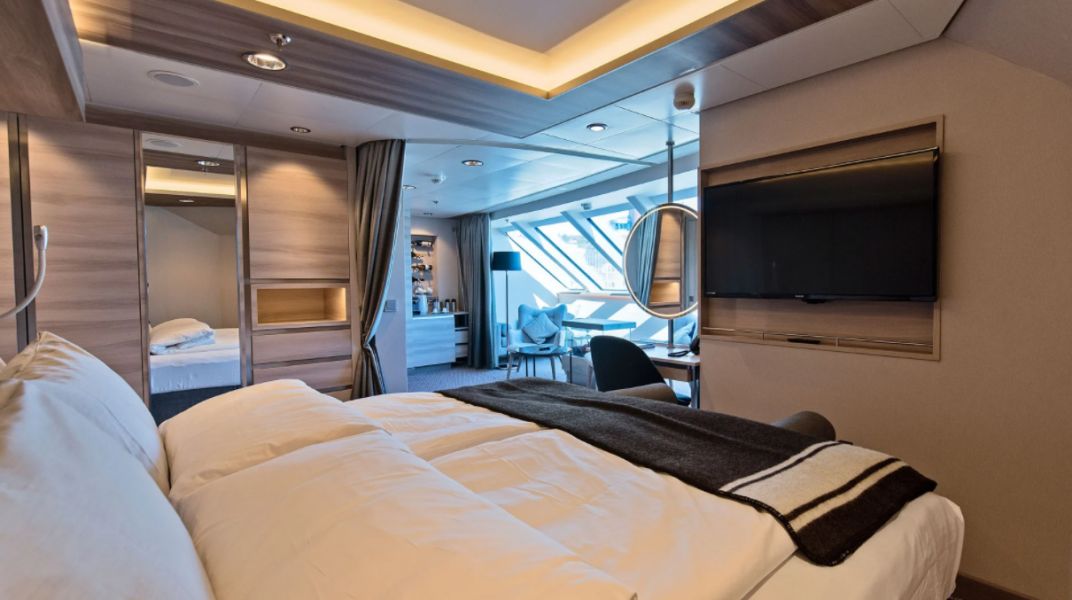
Corner suite with large windows. Corner suite with large windows. Flexible sleeping arrangements, TV, minibar, bathrobe, kettle, tea and coffee, espresso maker. Without balcony.
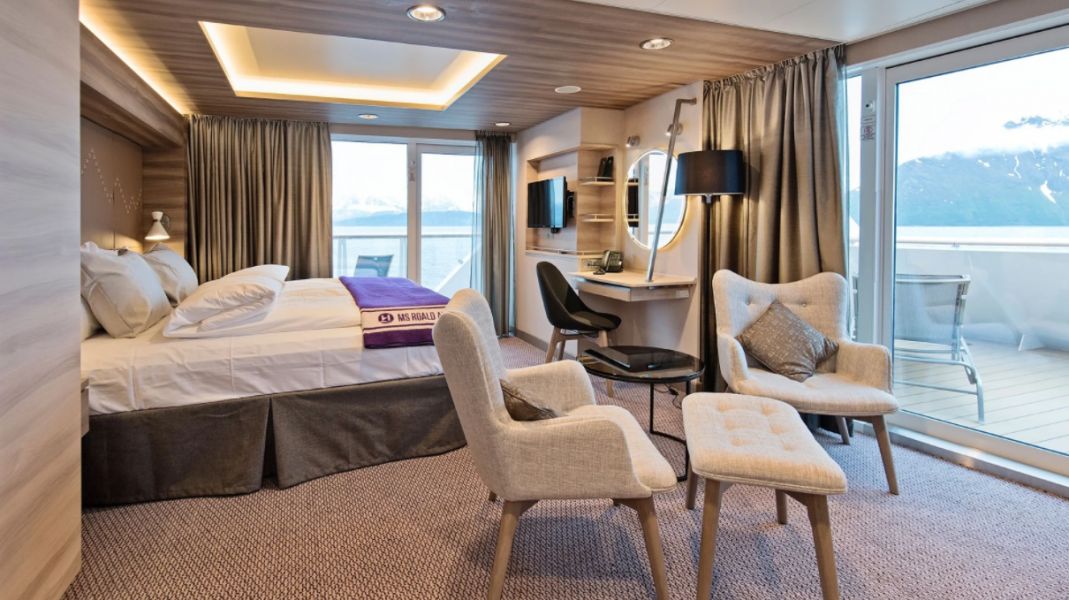
Aft Corner Suite with private balcony and hot tub. Various sizes, large windows, flexible sleeping arrangements, some with sofa, TV, minibar, bathrobe, kettle, tea and coffee, espresso maker
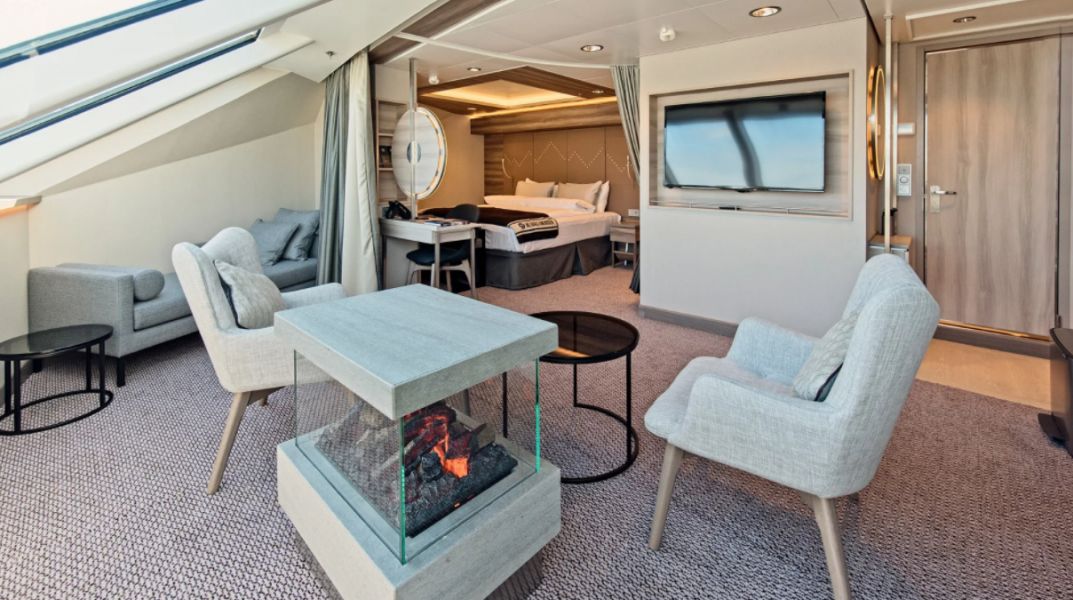
Large Corner Suite with private balcony, flexible sleeping arrangements∘, sofabed, TV, minibar, bathrobe, kettle, espresso maker. Adapted for guests with wheelchair.
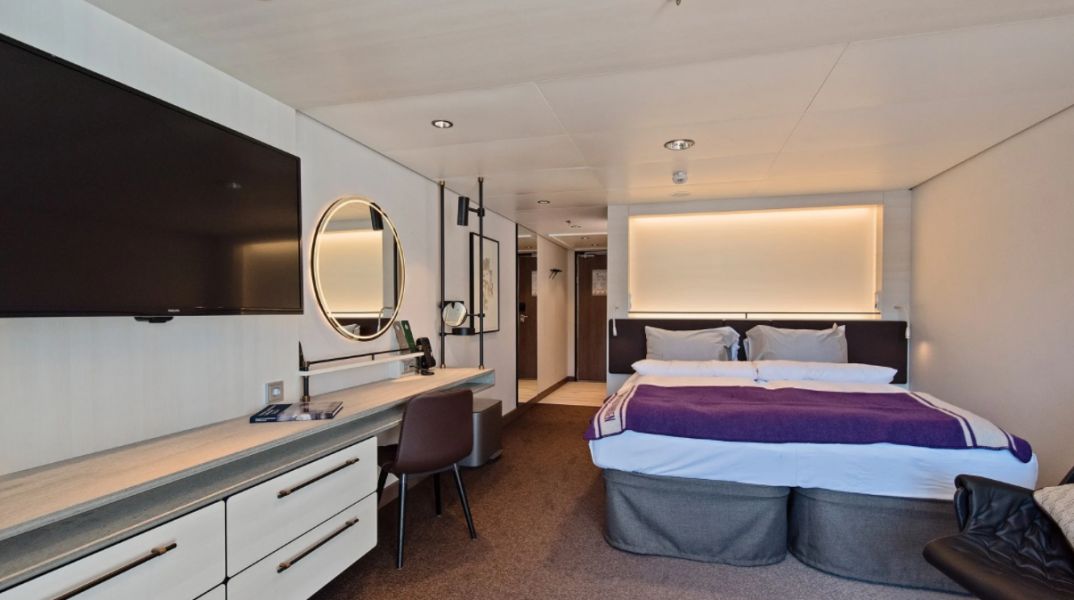
Suites with private balcony, different sizes, top-high decks, flexible sleeping arrangements, some with sofabed, TV, minibar, bathrobe, kettle, tea and coffee, espresso maker.
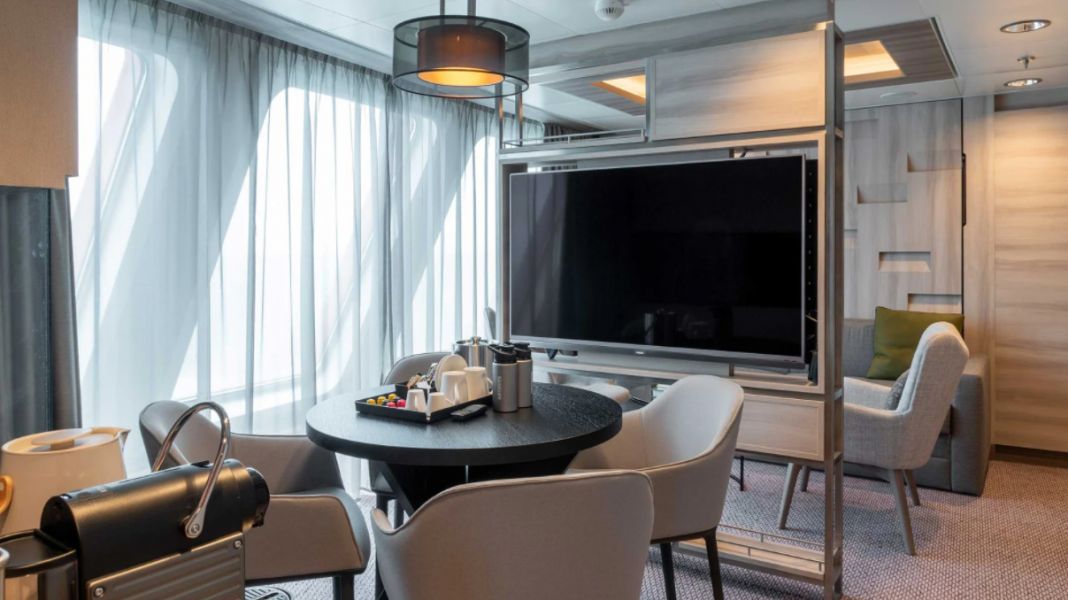
Extra Large Corner Suite∘ without balcony. Aft corner suite with sofabed, flexible sleeping arrangements, large windows, TV, minibar, bathrobe, kettle, tea and coffee, espresso maker.
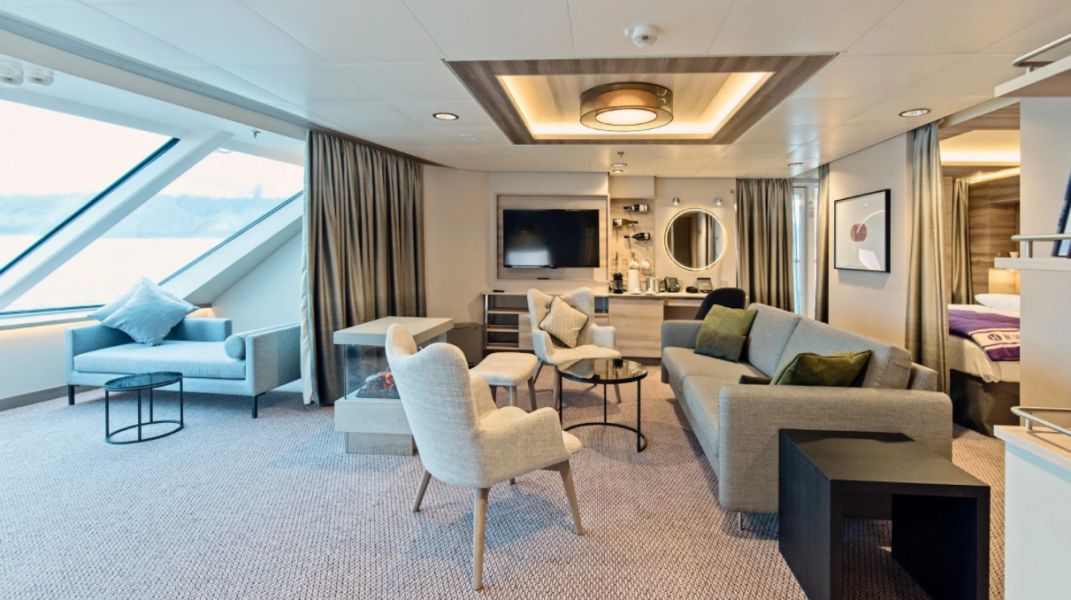
Extra Large Corner Suite∘ with private balcony. Ship’s most spacious cabins with large windows, flexible sleeping arrangements, sofabed, TV, minibar, bathrobe, kettle, tea and coffee, espresso maker.
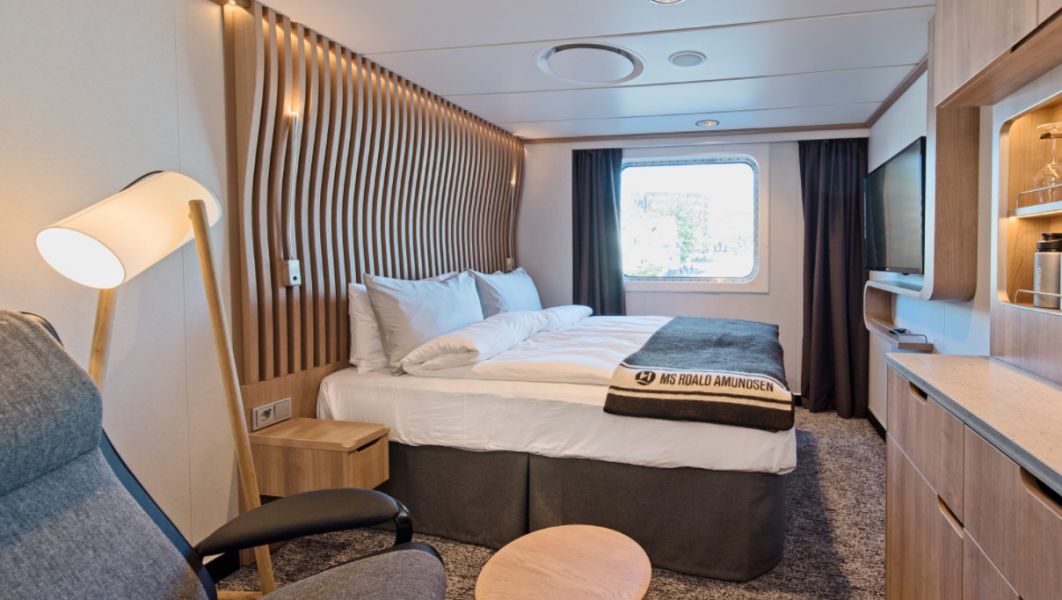
Cabins on middle decks. Double bed, TV.

Larger cabins on middle∘ decks. Most 20 square meters, flexible sleeping arrangements, some with sofabed, TV. Please note: This cabin is automatically made with a double bed. To order twin beds, please notify us at time of booking.
The images shown are for illustration purposes only and may not be an exact representation of what you find on the ship.
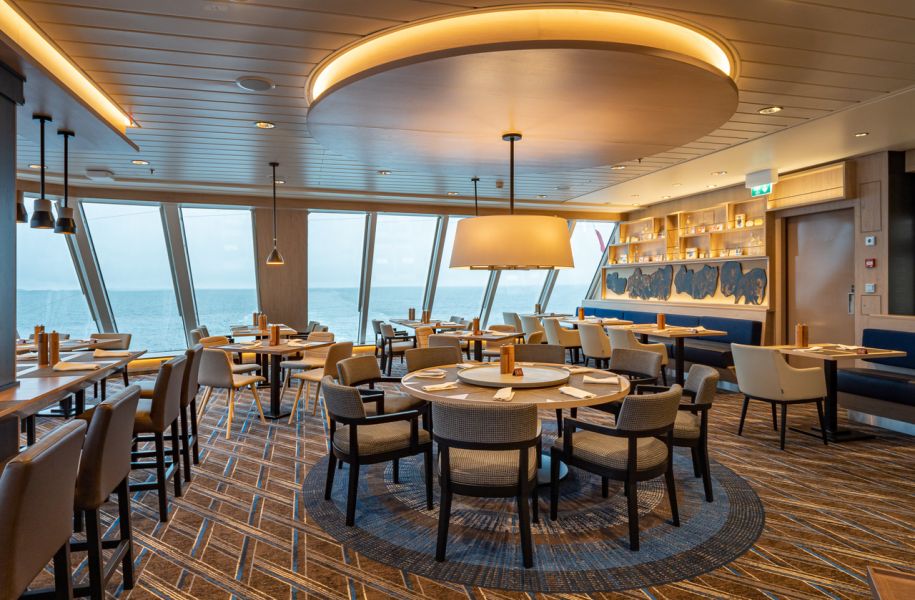
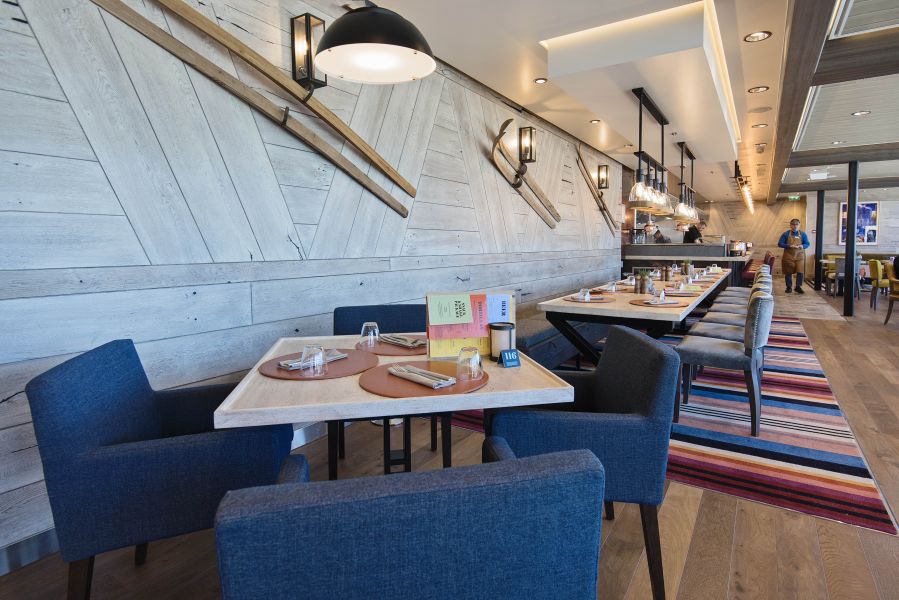
Based on the season's best ingredients, the chefs create either three-course dinners or lavish buffets. Being a coastal voyage, seafood dominates the menu, accompanied with fresh vegetables and delicately flavoured sauces. Each dinner ends with traditional desserts, like home-made cakes, puddings, berries or sorbet. Breakfast and lunch is served buffet style, while dinner is a set dinner.
The images shown are for illustration purposes only and may not be an exact representation of what you find on the ship.
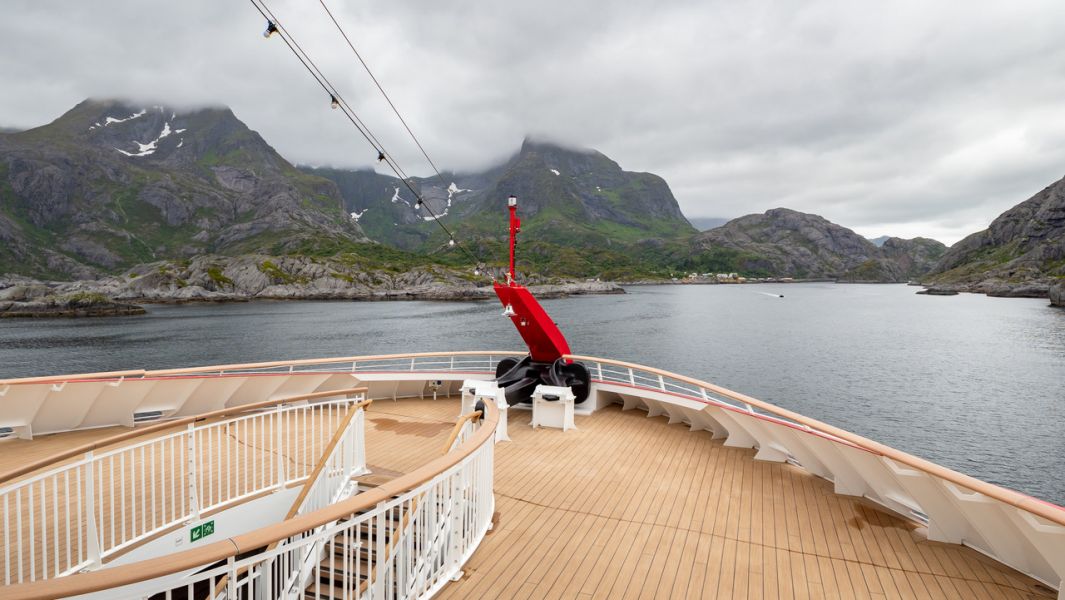
The ship has spacious outdoor areas. They are perfect vantage points to sit back, relax and watch the world go by. The observation deck is located on deck 11, where you will also find the outdoor gym and running track.
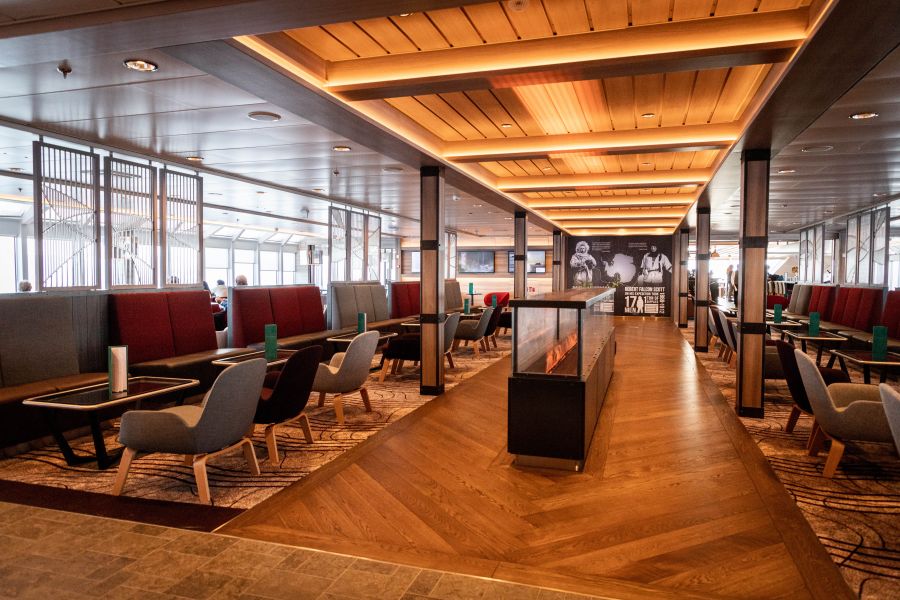
After a day of exploring new destinations, guests can relax and rejuvenate in the elegant Explorer Lounge, located on deck 10.

The ship has a small selection of books on different topics that is available to guests while on board. The library is located on deck 6.

The reception is located on deck 6.
The images shown are for illustration purposes only and may not be an exact representation of what you find on the ship.
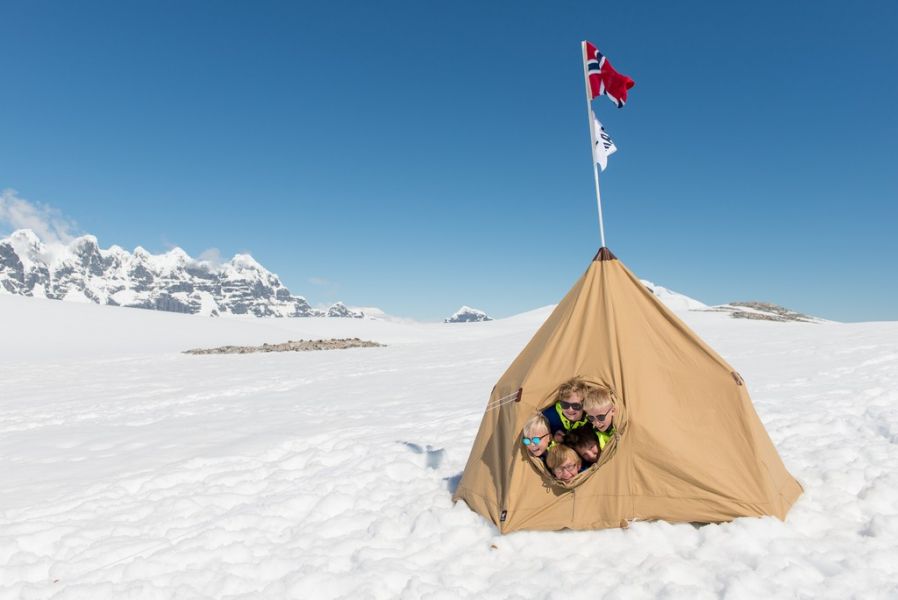
Young Explorer is a complimentary, year-round programme on selected Hurtigruten ships for curious and active youth aged 7-13 years of age.
The children will learn about other cultures, the importance of nature in our daily lives, and the impact humans have on our delicate and beautiful planet. The Young Explorers’ Programme makes it easier to meet other children on board, bond over common activities and form lasting friendships.
A dedicated Young Explorer host and daily on-board activities
A dedicated host will plan and organise all the activities, which focus on fun and eco-friendly learning events, tailor-made to awaken a sense of adventure. All Young Explorers will get a starter pack containing a t-shirt and activity book at the beginning of their voyage. Activity book assignments are related to the different exploration topics.
There will be daily on-board activities related to different Young Explorers’ topics. Through the Young Explorers’ Programme, children will get a deeper understanding of nature, climate and culture. Depending on seasons and destinations, they will also be introduced to topics like wildlife, local food, environmental protection and famous explorers. This will give the children a sense of what it is like to be a real explorer in beautiful, untouched surroundings.
Beach clean-ups
During each Classic Round Voyage in the summer on the Norwegian Coast, we will do a beach clean-up, teach the kids about the fragile balance that exists in the natural environment, and what we can do to protect it. This is done in cooperation with the Hurtigruten Foundation and Keep Norway Beautiful. Please note that beach clean-ups can’t be conducted if it’s snowy or icy.
The images shown are for illustration purposes only and may not be an exact representation of what you find on the ship.
| Return flights including luggage allowance | |||
| Overseas Transfers | |||
| 14 nights aboard the MS Roald Amundsen | |||
| Full-board dining included | |||
| Wine, beer & soft drinks included with lunch & dinner | |||
| Complimentary tea and coffee | |||
| Range of included excursions | |||
| No gratuities | |||
| Complimentary Wi-Fi on board | |||
| Engaging onboard activities and lectures | |||
| Port Taxes and Fees | |||
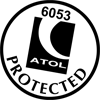 | ABTA and ATOL Protection* | ||
Fly/cruise package |
Date 16th May 2025 |
Nts 14 |
Interior  |
Oceanview £8,227pp |
Balcony £8,963pp |
Suite £10,479pp |
Interior  |
Oceanview £16,454pp |
Balcony £17,190pp |
Suite £18,706pp |
Date 16th May 2025 |
Nts 14 |
Interior  |
Oceanview £8,227pp |
Balcony £8,963pp |
Suite £10,479pp |
Interior  |
Oceanview £16,454pp |
Balcony £17,190pp |
Suite £18,706pp |


| Oceanview | Balcony | Suite | |
| (All prices are £GBP per person) | |||
| Mon 9th Jun 202509 Jun 25 | 8,316 | 10,627 | 11,457 |
| Mon 9th Jun 202509 Jun 25 | 16,632 | 18,943 | 19,773 |
Fusion Cruises when selling travel arrangements is a trading name of The Midcounties Co-operative Ltd. Fusion Cruises is an Accredited Body Member of Midcounties Co-operative Travel Consortium. (ABTA:P6652, ATOL:6053).
Book with Confidence. We are a Member of ABTA which means you have the benefit of ABTA’s assistance and Code of Conduct.
Some of the flights and flight-inclusive holidays on this website are financially protected by the ATOL scheme but ATOL protection does not apply to all holiday and travel services offered on this website. This website will provide you with information on the protection that applies in the case of each holiday and travel service offered before you make your booking. If you do not receive an ATOL Certificate then the booking will not be ATOL protected. If you do receive an ATOL Certificate but all parts of your trip are not listed on it, those parts will not be ATOL protected. Please see our booking conditions for information, or for more information about financial protection and the ATOL Certificate go to: www.caa.co.uk
